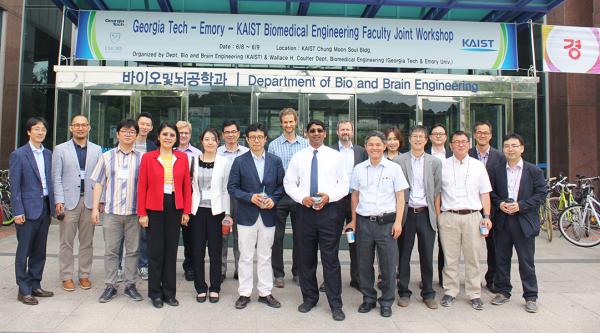The Department of Bio and Brain Engineering at the Korea Advanced Institute of Science and Technology (KAIST), and Georgia Tech and Emory’s Wallace H. Coulter Department of Biomedical Engineering (BME) held a two day biomedical engineering workshop June 8 and 9 in Daejeon, South Korea. These prominent schools recently completed a memorandum of understanding to engage and actively explore deeper research and scholarly collaborations. Biomedical engineering faculty from KAIST, Georgia Tech and Emory shared their latest research to help identify new research partnerships among faculty.
During the last 20 years, Korea has become a global leader and powerhouse of technology research and manufacturing. Korean companies and universities are at the cutting edge of science research and product innovation in many areas—this includes medical research. According to the New England Journal of Medicine, South Korea has increased spending on medical research by 24 percent.
“KAIST is clearly recognized as one of the best technology, science and engineering universities in the world,” said Hanjoong Jo, associate chair of the BME department. “Joint biomedical research projects between KAIST, Emory and Georgia Tech would take full advantage of many synergies offered by each school’s unique faculty expertise and core research laboratories.”
The five professors from Georgia Tech and Emory’s BME department that traveled to visit KAIST at their main campus in Daejeon were Ravi Bellamkonda, Hanjoong Jo, Garrett Stanley, Xiaoping Hu, and May Wang.
The professors in attendance from KAIST were Jong Chul Ye, Do-heon Lee, Philnam Kim, Ji-ho Park, Jung-Kyun Choi, Se-Bum Paik, Christopher Fiorillo, Sung-Hong Park, Ki-Hun Jeong, Dongsup Kim, Gwan-Su Yi, Sue-Hyun Lee, Yong Jeong, Yoonkey Nam, and Young-Ho Cho.
The workshop sought to identify impactful, long-term projects with realistic funding opportunities to forge new frontiers in medical science and engineering knowledge.
“I was very impressed by the dedication of faculty members within the department of biomedical engineering at Georgia Tech and Emory that makes this workshop very successful. Our faculty members at KAIST believe this is a good starting point for KAIST and Georgia Tech/Emory bioengineering department to work together with the same vision to become the world leader in bioengineering areas,” said interim-chair professor Jong-Chul Ye.
Recently elected department chair, professor Kwang-Hyun Cho, envisioned that he wants to further extend this joint workshop for fruitful collaboration between Georgia Tech, Emory, and KAIST in both research and education, and to use this opportunity as a common bridge for enhancing our international visibility in biomedical engineering.
In addition to pure research, exchange opportunities and educational programs are being developed for top biomedical engineering scholars to further their studies and research at either Georgia Tech, Emory or KAIST.
For further info, contact:
Walter Rich
Communications Manager
Wallace H. Coulter Department of Biomedical Engineering
Georgia Institute of Technology
wrich@gatech.edu
Media Contact
Walter Rich
Communications Manager
Wallace H. Coulter Department of Biomedical Engineering
Georgia Institute of Technology
Latest BME News
Jo honored for his impact on science and mentorship
The department rises to the top in biomedical engineering programs for undergraduate education.
Commercialization program in Coulter BME announces project teams who will receive support to get their research to market.
Courses in the Wallace H. Coulter Department of Biomedical Engineering are being reformatted to incorporate AI and machine learning so students are prepared for a data-driven biotech sector.
Influenced by her mother's journey in engineering, Sriya Surapaneni hopes to inspire other young women in the field.
Coulter BME Professor Earns Tenure, Eyes Future of Innovation in Health and Medicine
The grant will fund the development of cutting-edge technology that could detect colorectal cancer through a simple breath test
The surgical support device landed Coulter BME its 4th consecutive win for the College of Engineering competition.








